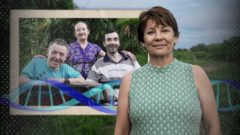In the quiet, rural town of Serrinha dos Pintos, less than 5,000 residents grapple with an alarming rate of disability among their children, largely due to a rare genetic condition named Spoan syndrome. This breakthrough came thanks to the efforts of biologist and geneticist Silvana Santos, who, over 20 years ago, identified the syndrome now bearing its name. The condition is a result of a genetic mutation affecting the nervous system, passed down when both parents share the altered gene.
Before Santos’s research, families lived without answers for many years, desperate to understand the ailments affecting their children. Santos's landmark discovery was the first documented case of this syndrome worldwide, earning her recognition as one of BBC's 100 most influential women in 2024.
Serrinha's unique social landscape, characterized by a high prevalence of cousin marriages due to its geographical isolation, exacerbates the risks of genetic disorders. A study by Santos revealed that over 30% of couples in Serrinha are related, with a concerning number of them having children with disabilities. While cousin marriages are common globally, the genetic risks are statistically heightened in such cases, underlining the importance of genetics education and awareness in this tight-knit community.
Santos's journey to identify Spoan syndrome began as a personal endeavor—the family of a neighbor urged her to explore the local health crisis. Her serendipitous visits to Serrinha were met with both lush landscapes and profound social connections, as many residents were related, leading to limited genetic diversity.
Through years of careful research and numerous trips back and forth from São Paulo, Santos collected DNA samples while engaging local families in dialogue. Her dedication culminated in a publication that revealed the existence of Spoan syndrome, detailing the genetic mutation responsible for the debilitating disorder.
Recent studies hint at the origins of this mutation, suggesting it may have been introduced to Brazil over 500 years ago by early European settlers. Evidence of European ancestry links patients in Serrinha with others who have been documented globally.
Today, awareness around Spoan syndrome is gradually transforming attitudes towards individuals with the condition. Accessibility has improved with the introduction of wheelchairs that aid mobility and independence. Santos’s ongoing work aims to assist couples in understanding their genetic predispositions without discouraging cousin marriages. Supported by the Brazilian Ministry of Health, Santos’s latest initiative is screening 5,000 couples for genes associated with serious recessive diseases, addressing the delicate balance of familial relationships and health.
Although Santos has moved on to other endeavors, she remains deeply connected to Serrinha, returning regularly and being viewed as part of the community. The collective hope is that through education and early screening, families will have the resources and support they need in navigating the complex genetics of their shared heritage.








